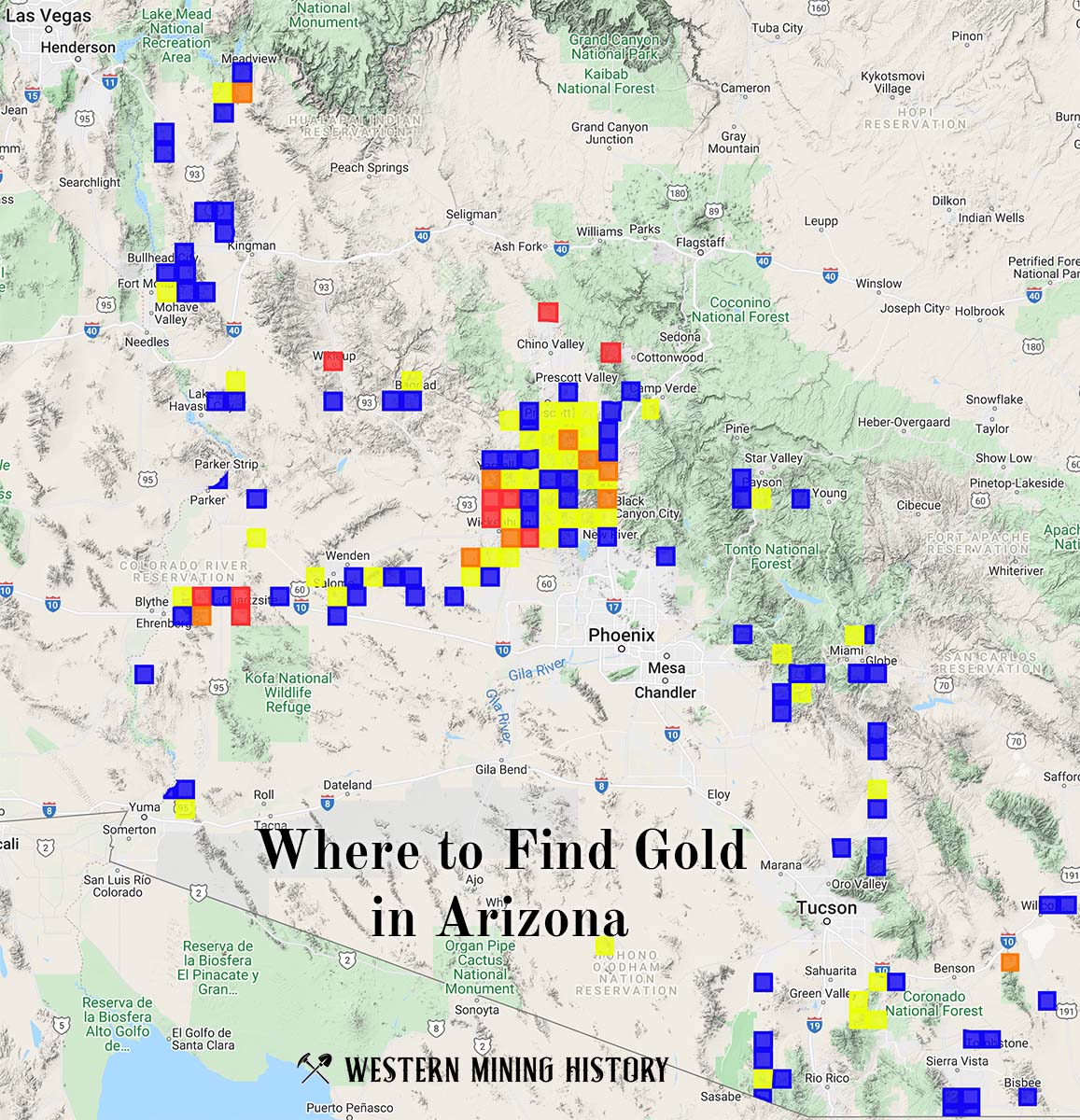The Lavender Pit is a copper mine located in Cochise county, Arizona at an elevation of 5,000 feet.
About the MRDS Data:
All mine locations were obtained from the USGS Mineral Resources Data System. The locations and other information in this database have not been verified for accuracy. It should be assumed that all mines are on private property.
Mine Info
Elevation: 5,000 Feet (1,524 Meters)
Commodity: Copper
Lat, Long: 31.4325, -109.89833
Map: View on Google Maps
Lavender Pit MRDS details
Site Name
Primary: Lavender Pit
Secondary: Copper Dog
Secondary: Pearl
Secondary: Bisbee
Commodity
Primary: Copper
Secondary: Gemstone
Secondary: Zinc
Secondary: Silver
Secondary: Gold
Location
State: Arizona
County: Cochise
District: Warren District
Land Status
Land ownership: Private
Note: the land ownership field only identifies whether the area the mine is in is generally on public lands like Forest Service or BLM land, or if it is in an area that is generally private property. It does not definitively identify property status, nor does it indicate claim status or whether an area is open to prospecting. Always respect private property.
Holdings
Not available
Workings
Type: Surface
Ownership
Owner Name: Phelps Dodge Corp.
Production
Year: 1973
Time Period: 1885-1973
Mined: 171045000.00 mt
Material type: KEITH, 1973, ARIZ. BUR. OF MINES BULL. 187.
Deposit
Record Type: Deposit
Operation Category: Past Producer
Deposit Type: Porphyry Cu
Operation Type: Unknown
Year First Production: 1950
Year Last Production: 1974
Discovery Method: Ore-Mineral In Place
Years of Production:
Organization:
Significant: Y
Deposit Size: L
Physiography
General Physiographic Area: Intermontane Plateaus
Physiographic Province: Basin And Range Province
Physiographic Section: Mexican Highland
Mineral Deposit Model
Model Name: Porphyry Cu
Orebody
Form: BLANKET
Structure
Type: R
Description: Pre-Mineralization Faulting And Tilting
Type: L
Description: Main Fault Directions, N10w To N40e, S30w To N50w, Pre-Mineralization
Alterations
Not available
Rocks
Name: Granite
Role: Associated
Age Type: Associated Rock Unit
Age in Years: 170.500000+-7.500000
Age Young: Jurassic
Name: Granite
Role: Host
Age Type: Associated Rock Unit
Age in Years: 170.500000+-7.500000
Age Young: Jurassic
Analytical Data
Not available
Materials
Ore: Bornite
Ore: Gold
Ore: Chalcocite
Ore: Cuprite
Ore: Turquoise
Ore: Sphalerite
Gangue: Pyrite
Gangue: Quartz
Comments
Comment (Deposit): RECORD # W002705 BY DENNIS P. COX HAS BEEN INCORPORATED INTO THIS ONE. ; INFO.SRC : 1 PUB LIT; 2 UNPUB REPT
Comment (Identification): **** SEE Copper Queen Deposit ID 10046248 Sacramento Mine Deposit ID 10046235 Cochise Deposit ID 10282707
Comment (Deposit): IN THE SACRAMENTO STOCK. THE DIVIDENT FAULTS "HORSETAILS", ITS STRIKE IS N20E AND DIPS S70, DISPLACEMENT ALONG THE FAULT IS ABOUT 500 FT. THIS FAULT SEPARATES THE SACRAMENTO/LAVENDAR PIT AND THE EXTENTION TO THE EAST (COCHISE PROJECT). CURRENT HIGHWAY FOLLOWS THE DIVIDENT FAULT. LARGE BULK MINEABLE LOW GRADE PORPHYRY COPPER, SUBSTANTIAL SUPERGENE GROUND WATER ENRICHMENT AT BASE OF LEACH CAP.
Comment (General): The Lavender Pit is a former open pit copper mine near the famous Copper Queen Mine. The Lavender Pit was named in honor of Harrison M. Lavender (1890-1952), who as Vice-President and General Manager of Phelps Dodge Corporation, conceived and carried out this plan for making the previously unprofitable low-grade copper bearing rock of the area into commercial copper ore. Phelps Dodge Corporation opened the Lavender Pit in 1950, at the site of the earlier, higher-grade Sacramento Hill mine. Production through 1974 totaled 86 million tons of ore averaging about 0.7% copper, or about 600,000 tons of copper produced, with gold and silver as byproducts. About 256 million tons of waste were stripped, but a portion of this was acid-leached for additional copper. Turquoise was also a by-product of this mining activity. Bisbee turquoise, also known as Bisbee Blue, is amongst the finest turquoise found anywhere in the world. Mining operations in the pit ended in 1974. The undeveloped Cochise deposit, located immediately north of the Lavender pit, contains an estimated 190 million tons of rock containing 0.4% acid-soluble copper, which may be mined in the future. Because of the competent host rock, this pit has much steeper sides than other open pit copper mines in the southwest area. The pit covers an area of 300 acres (1.2 km?), and is 900 feet (274 m) deep. Large tonnages of dump rock are placed around Bisbee, notably north of the residential district of Warren and other parts of the southeastern Mule Mountains area. http://en.wikipedia.org/wiki/Lavender_Pit
Comment (Commodity): LOW-GRADE COPPER ORES. THE TURQUOISE WAS A HARD DEEP BLUE, SOMETIMES FOUND IN A MATRIX OF HARD RED MINERAL (CUPRITE?)
Comment (Location): NW 1/4 SEC. 15. UTM ACC. UTM TAKEN TO CENTER OF THE PIT.
Comment (Workings): LARGE OPEN PIT. OVER 15 BENCHES, EACH BENCH 50 FEET HIGH.
Comment (Development): Lavender pit operated from 1951 to 1974 (GhostTownGallery.com). According to Metals Economic Group there has been no activity at either Sacramento or Lavender pits from 1989 through at least 2002.
References
Reference (Geology): Titley, S. R., 1993, Characteristics of porphyry copper occurrence in the American Southwest; in Kirkham, R.V., Sinclair, W.D., Thorpe, R.I. and Duke, J.M., Mineral Deposit Modeling, Geological Association of Canada, Special Paper 40, p. 433-464.
Reference (Ownership): History of Cyprus Mines Corporation, former owner here: http://en.wikipedia.org/wiki/Cyprus_Mines_Corporation
URL: http://en.wikipedia.org/wiki/Cyprus_Mines_Corporation
Reference (Geology): Mineralogy discussed here: http://www.mindat.org/loc-3304.html
URL: http://www.mindat.org/loc-3304.html
Reference (Commodity): A discussion of Bisbee turquoise here: http://www.nevadagem.com/pages/mineinfo.html
URL: http://www.nevadagem.com/pages/mineinfo.html
Reference (Production): KEITH, 1973, ARIZ. BUR. OF MINES BULL. 187.
Reference (Geology): Lowell, J.D. and Guilbert, J.M., 1970, Lateral and vertical alteration-mineralization zoning in porphyry ore deposits; Economic Geology, v. 65, p. 373-408.
Reference (Deposit): BLAIR, GERRY, 1992, THE ROCKHOUND'S GUIDE TO ARIZONA: HELENA, MONTANA, FALCON PRESS, 165 P.
Reference (Deposit): BRYANT AND METZ, 1966, IN TITLEY AND HICKS, GEOLOGY OF THE PORPHYRY COPPER DEPOSITS, SW NORTH AMERICA, P. 189-203.
Reference (Deposit): KEITH, S.B., 1973, ARIZONA BUREAU OF MINES BULLETIN 187, P. 88.
Arizona Gold

"Where to Find Gold in Arizona" looks at the density of modern placer mining claims along with historical gold mining locations and mining district descriptions to determine areas of high gold discovery potential in Arizona. Read more: Where to Find Gold in Arizona.